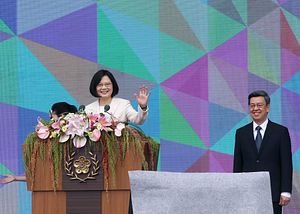President Tsai Ing-wen has been in office for almost 100 days, and stubbornly insists on denying the existence of the 1992 Consensus, which already exists and has worked perfectly for years. The history of modern democracies shows that if a leader achieves little or nothing during his or her first one hundred days in office, the leader’s power and prestige experiences a steady decline during the later term. After nearly three months in office, the future of cross-strait relations remains a giant question mark. Knowing this, Tsai really should be worried.
Tsai recently reiterated the importance of dialogue in cross-strait relations and regional stability, pledging to continue the government’s efforts to maintain stable ties with Beijing. However, as Stacy Hsu of the Taipei Times pointed out, Tsai “implicitly dismissed the so-called ‘1992 consensus’ in an interview with the Washington Post, saying it is unlikely that her government would agree to a deadline for accepting conditions that go against the public’s will.”* Cross-strait relations are already troubled and her comments have added fuel to the fire.
The danger manifests itself on several levels. Take the 1992 Consensus, for example. Tsai knows full well that the 1992 Consensus is the cornerstone of cross-strait relations. Without this cornerstone, not only will the ‘ground move and mountains shake,’ even her executive power could come tumbling down. Tsai has been incrementally ‘fine tuning’ her cross-strait rhetoric; Beijing has neither affirmed nor condemned her for this. It has however, flatly reiterated its pro forma response: “We insist on adherence to the 1992 Consensus and oppose any form of Taiwan independence. We resolutely safeguard our national sovereignty and territorial integrity.” Not only has the Beijing’s tone become icy cold, its Taiwan policy has also become harsher.
These alerts paint a worrisome picture. China appears resolute. It will take any and all steps necessary. In the past, China’s cross-strait policy took into account the U.S. factor, the Taiwan factor, and good will toward the Kuomintang. The importance of these three factors has sharply declined, although China has not yet dispensed with decorum. Taiwan will soon face an ever-increasing pressure; this is something Taiwan’s 23 million people cannot take lightly.
Defusing this critical situation requires goodwill and macro level calculations on the part of Beijing. Even more importantly, it requires action on the part of Tsai Ing-wen. Tsai must abandon her intentionally indecipherable cross-strait policy stance. On the matter of the 1992 consensus in particular, she cannot keep playing a “What’s my bottom line?” guessing game. Tsai must step up to the plate and clearly articulate her position on the 1992 Consensus.
Beijing’s bottom line is crystal clear. It will not accept the “1992 spirit” or “1992 historical fact” word games. As China sees it, one either uses the term “1992 Consensus” or the far more explicit term “one China.” Tsai must not miscalculate and ignore the risk of Taiwan remaining idle. She must take action to settle her differences with China over the 1992 Consensus.
The Tsai government asserts that it will maintain the status quo, but it also refuses to accept the 1992 Consensus. This is a clear self-contradiction. The 1992 Consensus is an integral part of the status quo. In fact, it provides the shared political framework for the status quo. For Taiwan, the 1992 Consensus means the “one China Constitution; one China, different interpretations; no immediate reunification, no independence, and no use of force.” It represents both adherence to principle and an expression of good faith by both Beijing and Taipei. In the past Beijing stressed one China; Taipei stressed different interpretations. But Beijing tolerated this and remained silent.
The 1992 Consensus is an evolving concept. It is the means by which Taiwan sought to maintain key principles such as “one China, different interpretations”; “no reunification, no independence, no use of force”; and peaceful, mutually beneficial cross-strait economic and trade exchanges. If this framework is shattered, the trade and diplomatic repercussions will do more than destroy the status quo. They will jeopardize Taiwan’s survival.
The consensus is that Tsai has repudiated the 1992 Consensus. The fear that cross-strait exchanges may end is not baseless paranoia. The cross-strait exchanges made possible by the 1992 Consensus have gradually been hollowed out, and will continue to be hollowed out. The cross-strait deadlock over the 1992 Consensus has presented Tsai with a double dilemma. Taiwan is being dragged, step by step, down a blind alley. The foundation on which cross-strait exchanges are conducted may eventually collapse. That is the major issue that warrants concern.
If indeed the first 100 days in office serve as a good indicator of a leader’s capability, Tsai’s quick fall in public opinion in the first three months threatens to make her an early lame duck. China is already distrustful of Tsai, with good reason, and she has few bargaining chips. Tsai’s challenge is to make a quick U-turn to affirm the 1992 Consensus. Time is not on her side, not now or in the future.
*A previous version of this article failed to properly cite the Taipei Times.
Yeni Wong is President of the Institute of Taiwan-America Studies. Ho-I Wu is a member of the Dean’s Council, School of International Service, American University. Kent Wang serves on the advisory board for The Taiwan Benevolent Association of America.

































